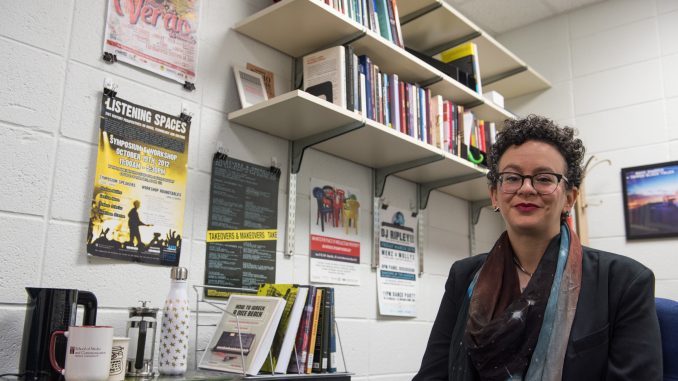
Larisa Mann remembers being on the rooftop of a three-story venue in Boston in the late 1990s when she heard a DJ playing jungle, a genre that mixes high-energy electronic dance music with Jamaican basslines and vocals.
When she saw the way it resonated with the people dancing, she knew she wanted to DJ.
“I just had never heard anything like it and thought it was the most exciting music I’d ever heard,” said Mann, who performs as DJ Ripley.
Mann, who became a media studies and production professor in Fall 2016, has roots in academia and music. She grew up near Boston and played in hardcore punk bands in high school and college.
In Fall 2016, Mann taught Information Society, which focuses on issues and theories related to the global post-modern society, and she’s currently teaching Media Criticism, which looks at how media are analyzed by people in the humanities and media theorists. She applied for a job at Temple partly because of the media studies and production department.
“Media studies is a field that’s in newer, more open and flexible fields where I felt like I could do a lot of the different kinds of things that I’m interested in and it would all make sense,” Mann said.
She was also considering jobs teaching courses in anthropology, sociology, Caribbean studies or history.
“It’s not always easy to explain how DJing and music-making is a legitimate part of your scholarly practice, but it is,” Mann said. “It’s not separate for me, so I felt here that was really recognized in a nice way.”
Laura Zaylea, a media studies and production professor, sat in on Mann’s guest lecture when she was applying to work at Temple.
“I feel like I left with new knowledge, but also sort of a sense of joy and a love for the subject matter,” Zaylea said. “I thought that’s exactly what one would want in a learning or classroom environment.”
Both of Mann’s parents are professors. But her career in academia began at Oberlin College in northeastern Ohio, where she received a bachelor’s degree in labor history and women’s studies in 1995.
While at Oberlin College, she was in a band that also had a DJ. A band member let her use his turntables, so she started practicing by herself when she could. Eventually, she bought a pair of used turntables and started inheriting and buying records.
While on an educational break from 1995 to 1999, she became more involved in the DJ culture and in Boston’s “underground music” events, she said. She also joined the city’s rave scene, after joining a group called Toneburst Collective, a music and arts group that put on multimedia events in unusual spaces.
The collective helped her get her first DJing gig in Allston, Massachusetts in 1997 and after that, she began mixing jungle, hip-hop and dancehall — Jamaican pop music — by “taking the music apart and putting it back together,” Mann said.
After her break from education, she enrolled in the London School of Economics and Political Science and received a master’s in economic history in 2000.
“While at first [education and DJing] seem so totally separate, in talking to Larisa I see she has a passion for each of those things,” Zaylea said. “They are in that way connected if you think about sort of making an inclusive, and joyful and arts-focused world … maybe the world needs both DJs and people that can influence change and help articulate policy.”
While getting her doctorate in jurisprudence and social policy from the University of California-Berkeley Law School, she remained involved in the music and DJ scene in San Francisco. She said being involved in the music scene in graduate school was what kept her grounded and balanced. In San Francisco, she was involved in a music group called Surya Dub, which emphasized creating a multiracial space in the area’s music scene. She finished her doctorate in 2012.
“It was really great to leave grad school and go to a place where all the things that everybody was stressed about in grad school were irrelevant, like nobody was worried about those things,” Mann said. “It was sort of refreshing to have a foot in each world. I don’t think I could have finished any of my graduate work if I hadn’t also been part of a music scene.”
While she was finishing her dissertation, Mann needed more teaching experience and moved back to the East Coast. She taught at Brooklyn College, Rutgers University and New York University. At NYU, she helped manage an in-house record label, Village Records, for two semesters.
She was doing a research fellowship at Fordham University last year when she began applying for jobs and ended up at Temple. She said she was interested in teaching at an urban college.
“I do think there are kinds of personal and social transformations that can happen in college,” Mann said. “I really like being a part of that process and I like it especially in a school where it is more diverse in all kinds of ways.”
Moriah Thoman can be reached at moriah.thoman@temple.edu.


Be the first to comment